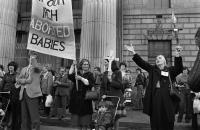
The passing of the 1967 Abortion Act that legalised abortion in the United Kingdom (excluding Northern Ireland) was a source of controversy in the Irish Republic, where access to contraception was illegal. After 1967, increasing numbers of Irish women availed of access to abortion services in Britain while the debate about women’s right to control their own fertility carried on against a background of difficult legal cases. In 1981 the Pro-Life Amendment Campaign (PLAC) secured pre-election promises from both Fianna Fáil and Fine Gael to amend the constitution to ensure that abortion could not be introduced either by legislation or by the courts. Many Catholic bishops and priests spoke out in favour of the amendment, but all the other mainstream churches opposed it. Fianna Fáil backed the proposal, Fine Gael was divided, and Labour and the Workers’ Party and liberal forces generally opposed it, although all stressed that they were not advocating the legalisation of abortion.


 John was involved in the publication of a pamphlet, No more chains! Why you should oppose the constitutional ban on abortion, knowing that what they were doing was in contravention of the law, specifically the law on censorship that actually prohibited advocacy on the issue.
John was involved in the publication of a pamphlet, No more chains! Why you should oppose the constitutional ban on abortion, knowing that what they were doing was in contravention of the law, specifically the law on censorship that actually prohibited advocacy on the issue.